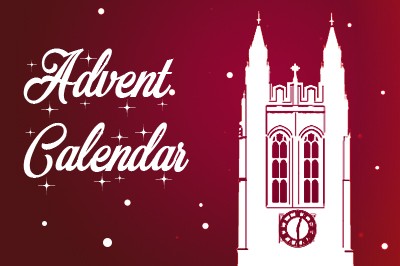Entering more deeply into the season of Advent, we are invited to consider who is this person Jesus whom we celebrate during this season. The Gospel at Mass today is the beginning of the Gospel of Mark, and its first line proclaims that Jesus is the Son of God (Mark 1:1–8). But then this Gospel begins not with the story of the birth of Jesus, like Matthew and Luke, but with John the Baptist and a prophecy from Isaiah. This is Mark’s way of showing us who Jesus is.
John the Baptist is the first to proclaim Jesus in this version of the story, and he calls him “one mightier than I.” The “mighty one” was a Jewish expression for the Messiah, the one awaited who would bring justice and salvation to God’s people. John the Baptist thus points to Jesus as the Messiah, the one who was awaited. The Jewish people expected the Messiah, but Mark tells us one more thing that wasn’t expected and is even more wonderful.
The Jewish people expected a great liberator, but Jesus is something even more. Mark quotes the prophet Isaiah, and the section he uses is the first reading at this Sunday’s Mass (Isaiah 40:1–5, 9–11). Mark uses Isaiah to proclaim that John the Baptist is to prepare the way of the Lord. But who is “the Lord”? Who is John preparing for? In the text from Isaiah, it is clear who the Lord is: the Lord is God. The full quotation in Isaiah makes that clear: “In the desert prepare the way of the Lord! Make straight in the wasteland a highway for our God!” These are not two different tasks for two different figures, but one task for one figure: to get ready for the coming of the Lord God. Mark’s claim is astonishing: that by preparing for Jesus as the Messiah, John the Baptist is preparing for the coming of God to his people. The coming of Jesus is the coming of God. Jesus is more than a great liberator, but God himself coming to his people. In Jesus, God comes into the world in a new and powerful way.
The connection Mark makes between God and the Messiah is even clearer when we read further in our first reading from Isaiah. The prophet cries out, “Here is your God! Here comes with power the Lord God!” The word “power” here is the same word in Greek that John the Baptist uses to say that Jesus is “mightier” than he. Jesus, the mighty one whom John points to, is the same one that Isaiah proclaims: “Here is your God! Here comes with power the Lord God.” The one who is coming, the one we prepare for during the season of Advent, is God.
The season of Advent then is about the coming of the Lord God with power in the person of Jesus. In Jesus, God comes to us! The Gospel of Matthew calls Jesus Emmanuel, which means “God with us” (Matthew 1:23). Mark does just the same thing by his elegant use of the prophet Isaiah to explain that John the Baptist prepares the way for Jesus, who is the Lord God who comes with power.
Mark’s citation of this passage from Isaiah also points our attention to what comes just before it: “Comfort, give comfort my people.” Here we see what Jesus comes to do: he brings comfort to God’s people. The mission of the Messiah, and God’s desire for his people, is to bring comfort in the midst of misery. Jesus comes with power to bring comfort. This mission of the Messiah was not just for one time in the ancient past, but for all times and people who turn to him, including our own. In this year of so much suffering, anxiety, pain, and loss, God’s desire is to bring comfort to his people. God sees our suffering, and comes to us in our need. The birth of Jesus, who is God with us, is the great historical event in which God came to bring comfort. But that event in time speaks to a reality in eternity: that God comes to his suffering people.
This Advent and Christmas will surely be like no other. It will, perhaps, be a quieter time. Less travel, fewer parties and celebrations, less shopping, and less time with family and friends. While there will be regret about that loss, it also opens space to allow God to come in to be with us, his people, to bring comfort. In the absence of so much else, God can be present, here with us more perceptibly. During this pandemic Christmas, it will be easier to prepare the way of the Lord by not having so many things to do. In the presence of so much discomfort, our need for the comfort that God can bring is all the more intense. If there was ever a time when it was clear we need God to be with us, it is now. This is exactly what Advent and Christmas are all about: that in Jesus, God is with us to bring comfort to a suffering people.
Boston College C21 Advent Calendar
The Church in the 21st Century Center is celebrating Advent with an exciting, interactive calendar. A different surprise will be unlocked each day of the season, so bookmark the page, and visit daily as we count down to Christmas.



